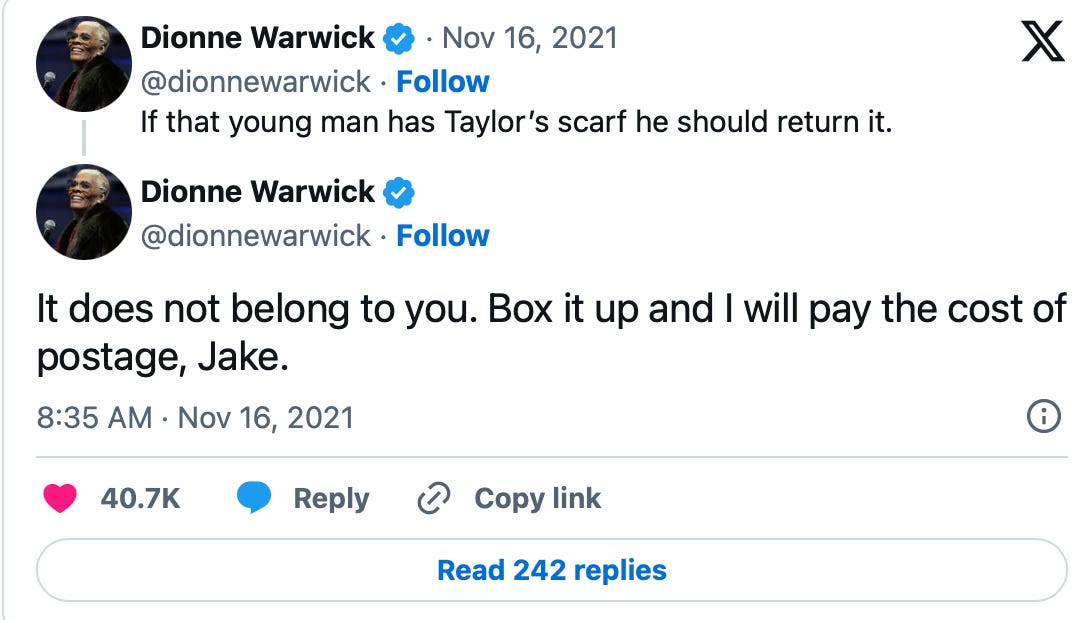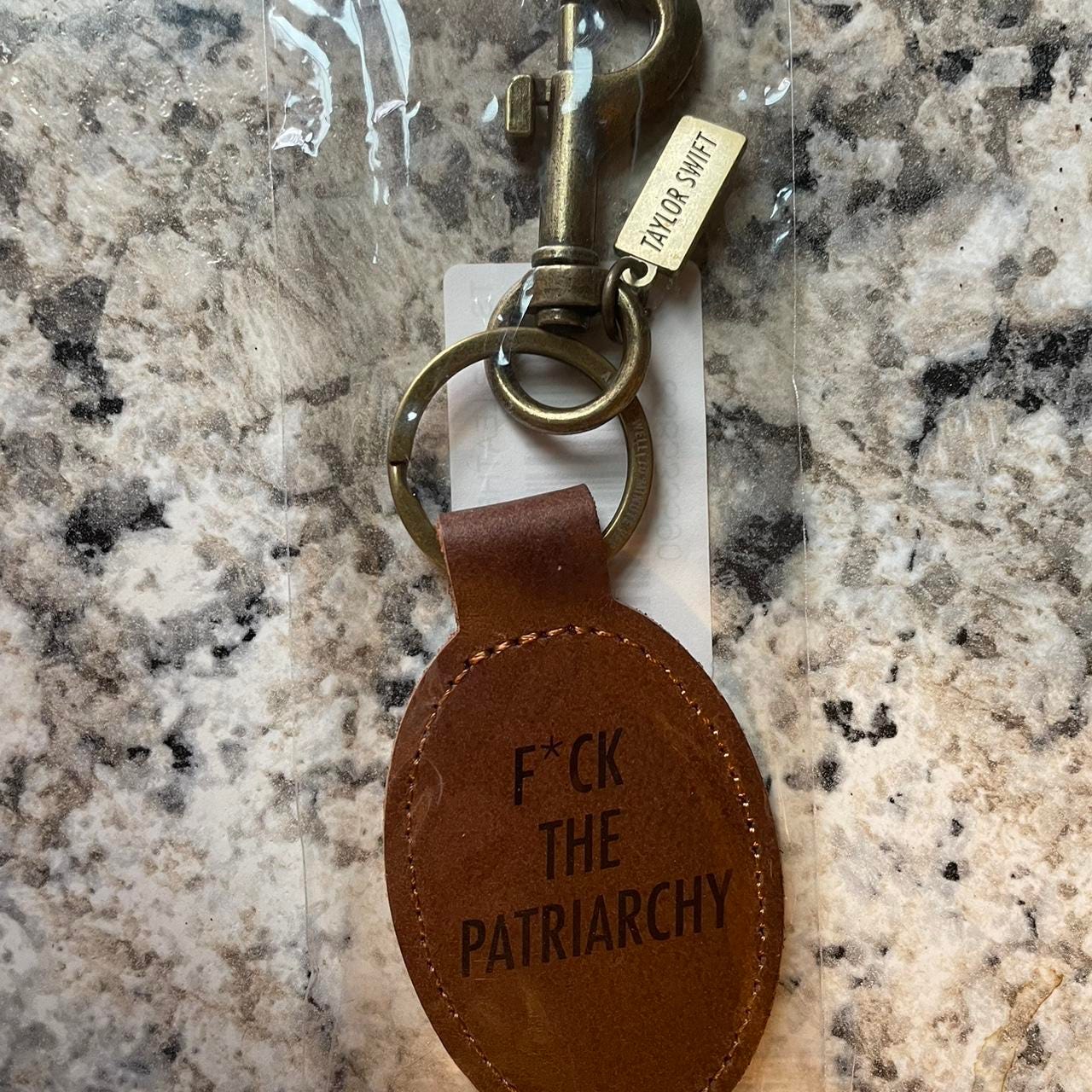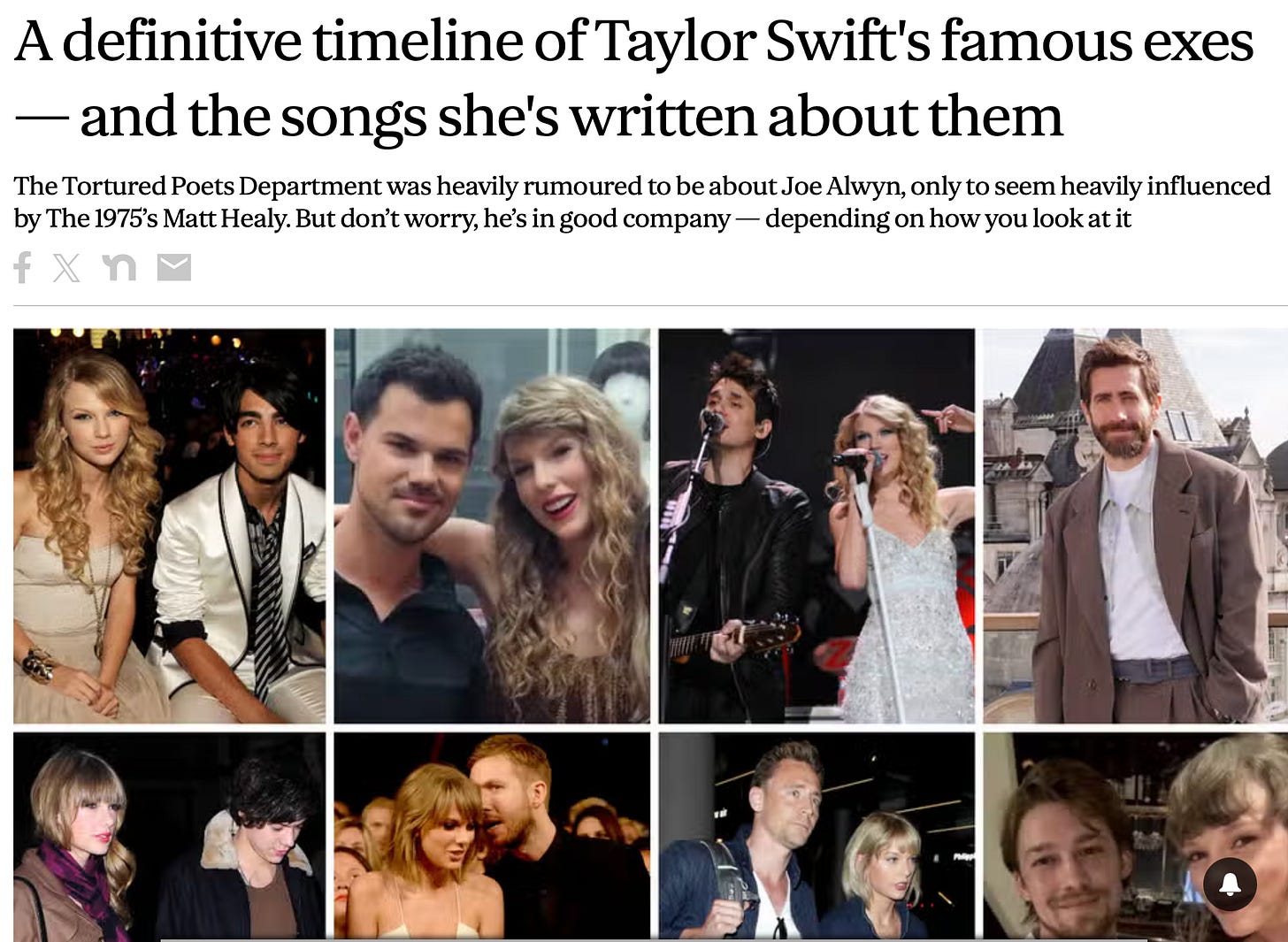Never Love A Singer
On Shade, Sweet Revenge, Kiss Offs and Savage Burns in Song
I have always admired the belittling savagery of this seeming innocuous Bob Dylan throwaway line from She’s Your Lover Now, a unfinished blinder of a song which is absolutely bursting with them:
And you, you just sit around and ask for ashtrays, can’t you reach?
We the listener are given a vision of this ex-lover for what the singer now sees she always was, self important, lazy, pathetic. Literally blowing smoke, a waste of space. Get your own ashtrays, sheesh. Throughout the song he strips her of all her affectations, her postcards of Billy The Kid, her picture books of the pyramid, the things that once intrigued him now seem hollow, or worse, pretentious. He’s over it.
Bob and his band apparently worked on recording this song, 12 hours, 16 takes, during the 1966 ‘Blonde on Blonde’ sessions, before finally abandoning it and never returning to it again. Like the woman in question, perhaps it was just too much to deal with. This is take 15, which roars along like a freight train til it goes off the rails at the end. The great @Greil Marcus called it ‘One of the most terrifying performances ever recorded’ in his book Mystery Train.
Similarly, the full ten minute version of Taylor Swift’s damning masterpiece All Too Well (co-written with Liz Rose) languished in a vault from 2011 until she rerecorded it and released it in 2021, a lifetime in modern parlance. A cutdown, less finger pointing version was originally released on her 2012 album ‘Red’.
A brutal love song that shape shifts and morphs time much like Bob’s Tangled Up In Blue, between in-the-moment blissful, tender vignettes, to the mind fuck of the incomprehensible aftermath, to the moved on-yet-secretly-still-broken years later present where our singer has finally pulled herself together enough to drop the standout reflections ‘You kept me like a secret but I kept you like an oath’ and crowd-screaming favourite ‘And I was never good at telling jokes, but the punchline goes: ‘I’ll get older, but your lovers stay my age.'(ouch).
The song sparked heavy cultural reflection too, from whether the scarf that anchors and drifts through the song and is obsessively scrutinised by scandalised Swifties and music critics alike and shown in Tik Tok reels worn by her and later by the actor the song is allegedly about (Swift says ‘For me the thing I keep really close is the identity of who these songs are about’), is a metaphor for her innocence/virginity to the now famous ‘Fuck The Patriarchy’ key chain line that somehow saw interested parties lose their collective fucking minds:
And you were tossing me the car keys, "Fuck the patriarchy"
Keychain on the ground, we were always skippin' town
and has spawned both official Taylor Swift merch lines and endless online dissections (like this one which sums it up all too well: “I’ve always loved this line because it conveys so much with so little. The boyfriend has a “Fuck the Patriarchy” keychain, which is meant to convey that he’s a feminist and aware of his male privilege. But he ends up treating her so poorly, like she’s disposable, so the keychain is just douchebag performativism. It paints such a complete picture of this dude.”).
Swift has been quoted as saying “I heard from the guy that most of Red is about. He was like, ‘I just listened to the album, and that was a really bittersweet experience for me. It was like going through a photo album.’ That was nice. Nicer than, like, the ranting, crazy e-mails I got from this one dude.”
For those who have kept even a casual eye on the entertainment pages, its almost impossible not to imagine ‘this one dude’ was the musician John Mayer, who told Rolling Stone in 2010 after their break up that Taylor’s cleverly titled song ‘Dear John’ was ‘lousy songwriting’ that he ‘didn’t deserve’.
Mayer now tells Rolling Stone that he learned about Swift’s feelings directly from her song. “I never got an e-mail. I never got a phone call,” he says. “I was really caught off-guard, and it really humiliated me at a time when I’d already been dressed down. I mean, how would you feel if, at the lowest you’ve ever been, someone kicked you even lower?” When asked about the song’s line, “Don’t you think I was too young to be messed with?” Mayer says, “I don’t want to go into that.”
Here’s another key sample from the song ‘All the girls that you've run dry have tired, lifeless eyes cause you burned them out’.
Other casually scathing Taylor lyrics include:
“I bet you think about me when you’re out at your cool indie music concerts every week, I bet you think about me in your house, with your organic shoes and your million dollar couch”
"I regret you all the time"
“I forgot that you existed”
“I’m shining like fireworks over your sad empty town”
“I wish you were a better man.”
‘Jokes’ abound along the line of ‘I love her music but god, who would want to go out with her’. Even serious newspapers can’t help but get in on the action. But what’s a songwriter to do? Songs get written about things that affect us, the only only reason Taylor seems to have an abundance of songs about exes is because she is so damn prolific at songwriting and her life is lived under such a microscope.
I’m sure if we lined up Dylan songs that explore the complexities of human relationships against Taylor’s catalogue there'd be little difference in terms of volume. And yet we don’t describe Dylan as being obsessed with taking down his exes in song. Maybe that speaks more to the difference in eras and their ages than a gendered difference but it’s hard not to see the way Taylor is painted constantly as a lyrically vengeful ex through a feminist lens. Its dismissive of her talent to presume that her songs are just about putting the boot in.
‘Yeah I think the worst thing would be to date her for a year and a half and not have a single song written about you.. cough Calvin Harris cough ..I mean that must sting lol’ (online comment from a fan)
I rather love this defiant statement she made to accompany the release of her latest album ‘The Tortured Poet’s Department’: This writer is of the firm belief that our tears become holy in the form of ink on a page. Once we have spoken our saddest story, we can be free of it.
Taylor writes for herself, to make sense of things, to let go of things, because that’s what songwriters do. What songwriters have always done. Enter at your own risk, I say.
Alanis Morisette’s ‘You Oughta Know’ was considered shockingly rageful when it hit number one in 1995, with lines like ‘And every time I scratch my nails
Down someone else's back, I hope you feel it’.
She recorded the song in one raw take with producer Glen Ballard in his home studio within hours after writing it, before she even had a record deal. She was concerned about the hurting intensity of the lyrics, but Ballard encouraged her to record it, saying ‘You have to do this’. He reflects’ It's not the best recorded vocal in the world - some of it is too hot - but that's the only time she ever sang it in the studio. Even when we were getting ready to put the record out, all those vocals were the original vocals. I've never done anything that authentically live’.
Alanis later told Spotify ‘The context is important. I didn't know that many people would be hearing the song. I didn't think the whole planet would be hearing it. I was writing it so I didn't get sick. I was writing it to get it out of my body, the same way I would speak to a therapist or my best friend. If I didn't speak about it, I would have gotten sick. It was very cathartic. I thought that writing songs with these subject matters in them would mean I wouldn't have to talk to human beings. But having sung 'You Oughta Know' countless times over the years, the relationship itself was still tinged with pain, and I quickly came to see that the process of writing these songs was very cathartic, but it wasn't healing - I still had to interact with human beings to resolve things.’
Various ex-es have claimed to be the subject of the song. Alanis laughed in an 2015 Entertainment Weekly interview ‘You know you don't sound like the greatest guy in the world, right?’
She also explained ‘I didn't write it to get back. Everybody called it the perfect revenge song, but that's not what it was. It's a devastated song, and in order to pull out of that despondency, being angry is lovely. I think the movement of anger can pull us out of things. Fifty-five people can take credit for that song, and I'm always curious about why they're doing it. ‘
She has said she will never reveal who the song is specifically about.
Carly Simon’s scornful banger ‘You’re So Vain’ has also been subjected to public detective work about the identity of it’s subject since its release in 1972, partly due to Carly’s high profile relationships with contenders Mick Jagger, Warren Beatty, Kris Kristofferson among others. The original title for the song was ‘Ballad of a Vain Man’.
In a 1986 interview for the book Behind The Hits, she stated ‘There isn't as direct an answer as you would like, or as my public would like to hear. I mean, I can't answer and say it is about Warren Beatty, who a lot of people think it is about. Yes, it is about Warren Beatty. But it's not only about Warren Beatty.’
Carly told Uncut in 2010: ‘I didn't take the song as seriously as all that. It wasn't vengeance - it wasn't Anna Karenina. It was, 'From this point of view, you don't necessarily look as good as you think you look.' There's not an iota of hate in it. There may be much more of an iota of feeling hurt or rejected.’
Taylor Swift named the song as her number one inspiration in a 2015 ‘Songs That Made Me’ list.
Driving on a LA freeway late one night, feeling all the ghosts and shadows of all the singers and songwriters I loved that had probably driven the same freeways and been inspired to reveal their deepest cuts and darkest bruises and make them into songs that that stream through our speakers and radios, I was inspired to write a song for Taylor and all the rest of those singers, and I’m right back surrendered into that narcotic rapture-of-the-highway like Joan Didion every time I sing it or hear it.
It’s on ‘Transatlantic Light’ and it’s called Never Love A Singer. The rather beautifully deranged backing vocals singing ‘la la la la all the way’ are performed by Robyn Hitchcock and Sam Worrad, who co-wrote the song with me.
I’m so grateful to all the songwriters who have put into words all the stuff that hard to say, that we push down and keep hidden, that we’re afraid or feel bad about thinking but want to yell it to the world or use like a knife to excise the hurt and pain; the songwriters that aren’t afraid to sound mean or rageful or insane or broken so we can listen and feel heard and don’t feel so alone.
A final note, a recently found something I’d jotted down when my son was four, and was lost in a moment singing beautifully to himself:
Me: Maybe you'll be a singer like Mama when you grow up?
Four Year Old (throws himself on the floor, howling & sobbing): I just want to be normal!
Stay weird friends, and tell it like it is,
Lo x







I've just listened to She’s Your Lover Now and got completely absorbed in all the lyrics. Such a great character sketch, not just of one character but an incestuous little bar scene! Greg Dulli from Afghan Whigs wrote some pretty brutal songs about exes, not least What Jail is Really Like. Best listened to, rather than just read, to get the full visceral effect!
“It wasn't vengeance - it wasn't Anna Karenina.” OOOOH I LOVE IT. I would love to have written that song, and to have a one-liner like that about it!!!!
Very fine post, thank you !!